*******************************************
I have not received any encouragement or inducement from anyone to write about or discuss any information related to the Manchester Attack. All research discussed is exclusively my own and based solely upon information freely available in the public domain.
*******************************************
Independent journalist Aisling O’Loughlin is of the view that everything we have been told about events inside the City Room of the Manchester Arena on 22nd May 2017 at approximately 22:31 is true. I think the evidence clearly shows there was no bomb.
Aisling had the good grace to take me up on my offer to debate the evidence with her. I think the debate and disagreement are important, as does Aisling, and I thank her for the opportunity.
Aisling says that she wishes to honour the dead and that, by questioning the Manchester Arena hoax, I and Richard D. Hall—who initially reported much of the physical evidence—are dishonouring their memory. I strongly disagree with Aisling on this point.
I do not speak for Richard D. Hall and I do not know what he thinks, but I think it fair to say that all of us who question the official account of the so-called “Manchester Arena bombing” want to know what happened to the reported victims.
It seems to me, in refusing to consider the evidence that shows there was no bomb, Aisling is among the defenders of the official narrative who are disinterested in what caused the reported deaths. Without for one minute suggesting it is her intention, it is Aisling who is effectively dishonouring the apparent deceased.
Aisling emphasises that people who question the state’s account cannot explain what happened to the reported victims. In order to establish what DID happen to those people, there needs to be further investigation. Unlike Ailing, I don’t profess to know what happened to them. I have reported the overwhelming evidence which shows what DID NOT happen to them.
Contrary to Aisling’s claims, I have not insinuated that the injured Manchester Arena “victims” or the bereaved families are liars. In my book, I have explored why some of them may have provided provably false statements. There are many potential explanations for this. Ultimately I conclude, absent significant further investigation, we cannot know why some of those statements are evidently false.
Aisling’s argument appears to be that we should completely ignore all of the observable physical evidence and instead unquestioningly accept whatever the bereaved families and the injured believe, irrespective of the fact that there is no evidence of a bomb. This is an appeal to emotion fallacy, not a rational argument.
Aisling is concerned that evidence may have been provided to us by the state to lead us into a trap. She contends that people who question the official account can later be exposed as heartless liars. Notably, the accusation of critic’s callous disregard for the victims is precisely the one levelled by Aisling.
That said, I agree with Aisling to the extent that I suspect that is how the state intends to "use" both the questioning of the event and Hall's court case. That does not mean the state wants people to know anything about the evidence which exposes the Manchester arena hoax.
The state "trap," Aisling suspects, is designed to make so-called "conspiracy theorists" appear like a rabid, unhinged fringe. But this can only succeed as longs as the logical fallacy of appeal to emotion is allowed to prevail instead of looking at the observable physical evidence.
The only possible way the state could “expose” those of us who question the official account is to “debunk” the evidence we cite. That means the state would have to openly acknowledge and discuss the evidence revealed by, for example, the Parker photo, the Barr footage, the police chatter recordings, etc.
To date, despite Aisling’s claim that the state has used Hall to drive people toward this evidence, as I pointed out in our discussion, the state and its legacy media have done everything they can to deny the evidence and stop anyone discussing it. This includes the state censoring the evidence presented by of Richard D. Hall, the journalist who first reported the hoax and brought it to my attention.
If the state wants people to be aware of the evidence, as Aisling contends, then why doesn't it highlight that evidence? Why did Hall have a summary judgement brought against him specifically barring him from discussing the evidence in the High Court?
Just like the state, Aisling is evidently imploring people to reject or even refuse to consider the evidence. Aisling is using precisely the same tactics the state has deployed to uphold the City Room element of the state’s account.
Aisling is appealing to an independent media audience and framing the argument from a somewhat different perspective. Aisling suggests that we should not examine the evidence exposing the hoax because by doing so we would fall victim to the machinations of the state.
To flesh-out this contention, Aisling further suggests Richard D. Hall is some sort of controlled op,' utilised for this end. Unfortunately, by arguing that real physical evidence is irrelevant and that only the emotional accounts of the bereaved have credibility, it is Ailing who is actually serving the interests of the state.
Unlike Ailing, I do not infer she is some sort of state asset. I do note, however, that Ailing, unwittingly perhaps, is effectively acting in the states interest and protecting the state’s Manchester Arena narrative.





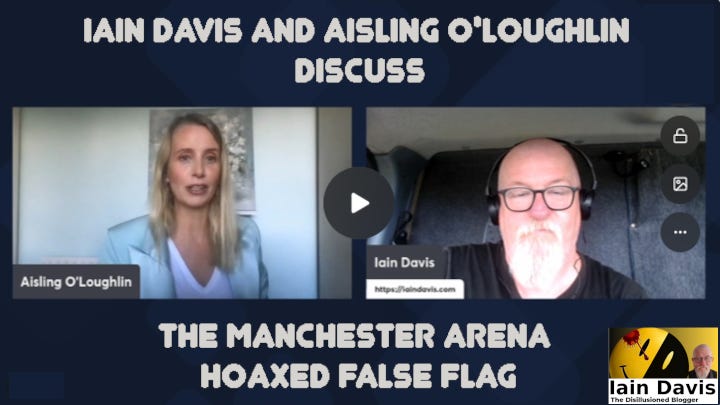
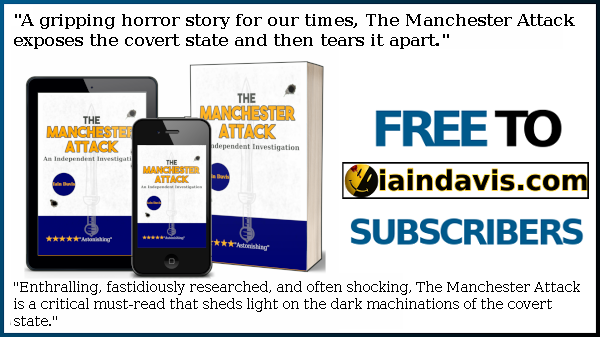

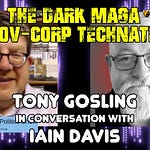
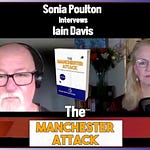


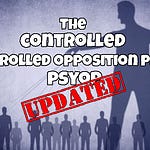

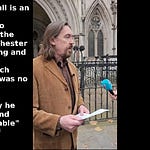
Share this post